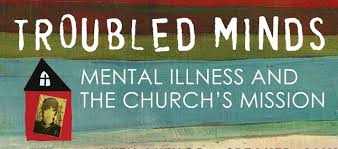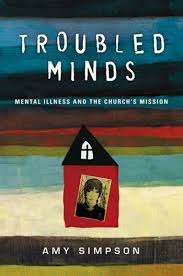Imagine a world in which your mind slips in and out of reality. A world where at times it seems like everyone and everything is against you. Imagine a mind that becomes so overwhelmed you simply shut down. Only those automatic functions like breathing and a beating heart remain, yet even those feel disrupted.
Such is a life for those with a chronic, severe mental illness, particularly when untreated. In her book, Troubled Minds: Mental Illness and the Church’s Mission (InterVarsity Press, 2013), Amy Simpson describes her mother’s world of schizophrenia. Simpson shares her own feelings of helplessness in moments when her mother would slip back into a catatonic state, unable to even walk to the car to go home. Not only were there very few who offered to help, but there were few who did not contribute to the shame and judgment of her mother’s bizarre behavior during these episodes.
Mental illness is real, and so is the stigma that so many continue to face today. Simpson’s description of the church’s response to mental illness is absolutely spot-on. As more statistics become available on the prevalence of mental illness, many such as Simpson are sounding the alarm to the church that has continued to ignore or stigmatize those suffering in our midst. On page 104 Simpson writes,
“In many churches, intentionally or unintentionally, the overriding emphasis is on ‘victorious Christian living,’ with the basic assumption that real Christians don’t have problems–or at least not crippling, persistent problems that a prayer or two won’t cure.”
Because of the general lack of understanding of what constitutes a clinical mental illness, many Christians deny the reality of mental illness. There is a prevalent view that feelings and behaviors can or should be controlled, and those that find their emotions or thinking out of their control must have a spiritual problem. Those who find they cannot “pray away” their symptoms are left without any answers and quickly turn to self-blame.
Simpson is gracious and empathic to pastors and lay leaders who often cannot respond because those with symptoms are not making their needs known. Because of shame and stigma, those suffering with mental illness frequently do not come forward to their pastors, thus perpetuating the cycle in which there is a lack of help offered.
Simpson offers ideas for pastors and church leaders on how to improve the response to those with mental illness. She suggests the creation of peer-led groups within the church, where those facing mental health challenges can come together for support. Another step all churches can take is to become more open to broken and hurting people. Jesus dwelled in the muck and mire, and we as Christians must do so as well. Don’t try to make the problem go away–just be there and walk alongside offering support and help where needed. Christians can also talk about mental illness, sharing their personal stories. Pastors can do this from the pulpit, church members can do this in small groups or within natural relationships. Talking about your own experience or the experiences of a loved one gives validation and acceptance to those quietly suffering. Finally, Simpson encourages those in the church to become familiar with the mental health resources within their own communities. Having a friend encourage your mental health treatment is a major factor in the follow through and ultimate success of that treatment.
Troubled Minds is a must-read for every Christian. Every single one of us needs to be engaging in this conversation to counter the false messages permeating the church today. Blame, stigma, shame, and marginalizing need to end within our walls. A simple conversation can go a long way towards changing your church’s attitudes and culture around mental illness.
To those who are called into the field of Christian counseling, I would add this message: come back to the church. Our churches need to have professionally trained and licensed counselors on staff, ready to respond with accessible services where people are most likely to come for help. Being on a church staff gives you a platform to change the church culture, a voice to educate the church about mental illness, and a partnership with the pastors that is only possible when you work closely together day-in and day-out. Read more about the Church Therapy model here and become a part of the movement to bring quality mental health care into the church setting.
Keep up with the conversation! Follow me (@ChurchTherapist) and Amy Simpson (@aresimpson) on Twitter. And don’t forget to subscribe to my blog for more articles on mental illness in the church.


